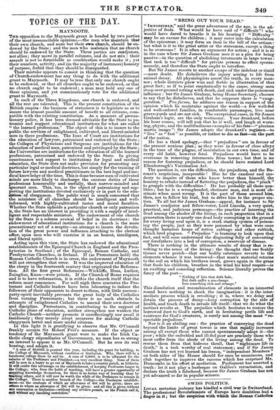"BRING OUT YOUR. DEAD."
" TAIPOSSIBLB," said the great adventurer of the age, is the ad= jective of fools. What would he have said of " difficult"? who would have dared to breathe it in his hearing ? " Difficulty" may be an excuse for children ; it may enter into the calculation of the epicurean ' • it may form an item in the bill of the artisan : but what is it to the great artist or the statesman, except a thing to be overcome? It is often an argument for action; and it is so in the case where Sir James Graham uses it as a plea for being passive—in the question of abolishing interments in large towns : that task is too " difficult " for private persons to effect sponta- neously, and therefore the State ought to interfere. But Sir James resorts to another escape of the indolent or timid —mere doubt. He disbelieves the injury arising to life from animal decay. All physiologists assert the truth, m every man- ner ; whole districts grow wan and feeble in illustration of that great fact; as if to point emphatically to the cause, strong men stoop over ground rotting with death, and sink under the poisonous influence : but Sir James Graham, being Home Secretary; chooses to say that he disbelieves, and that he supposes there is "exag- geration." Pro forma, he adduces one reason in support of the opinion which he maintains against the world—a few well-fed and well-ordered families, in comfortable parsonages, live near
ave-yards and are not sick. The exceptional cases, in Sir James raham's logic, are the only testimony. Your drunkard, before his hour comes, will tell you that be is well, and laugh at warn- ing, physic, and the multitudinous examples of his fate—" plurima mortis imago ": Sir James adopts the drunkard's regimen—to "live" as "fast" as possible, or rather to die as•fast-;-on the part of the nation.
He has a third apology,—that " prejudices" are in favour of the present noxious plan ; as they were in favour of close alleys in the time of the plague, of inoculation in our own time; and' of every old habit, however fatal. Prejudices would have to be overcome in removing interments from towns ; but that is no reason for fostering prejudices, or he should have resisted Lord Ellenborough's Vaccination Act.
The question is, are the difficulties, the prejudice's, and the Ba- ronet's scepticism, insuperable ? Has he the candour and Mo- desty to inquire of those who know better than himself, the honesty to rebuke instead of flattering the prejudices, the " pluek " to grapple with the difficulties ? He has probably all thoseeua- lities ; but he is a wrongheaded, obstinate man, and • is moist ob- stinate when most wrong. It is thepart of those around him, then, not to follow his lead, but to drive him to the proper sta- tion. To all but Sir James Graham—appeal, for instance to Sir James's coadjutor and fellow-voter; Lord Lincoln, a-very quiet, practical, and judicious personagethe practice of interring the dead among the abodes' of the living, in such proportion that in a generation there is nearly one dead body corrupting in the ground for every living soul upon it, is a stark staring system ofPoision- in,e- the people, just as they were poisoned by what were once thought harmless heaps of rotten cabbage and other rubbish,
which bred plagues. Prejudice " is learning to look 'upon that fact, and will soon understand the disgusting folly of converting' our forefathers into a bed of corruption, a reservoir of disease.
There is nothing in the ultimate results of decay that is re- volting to the sense of the living : the thought -that our fleshly tissues never perish—that our bodily substance reverts to the elements whence it was borrowed—that man's material returns to the soil on which his brethren tread, grows again in the grass that feeds his children, breathes in the wind his kind respire—is an exalting and consoling reflection. Science literally proves'the fancy of the poet— "Nothing of him that doth fade,
But doth suffer a sea-change Into something rich and strange."
This dissolution and recombination of elements in an immortal round have nothing to shock the imagination : it is the inter- mediate process which is revolting ; it is, where we delay and detain the process of decay—keep corruption by the side of health, and teach death to invade life itself—that we do what the instinct revolts at. The prejudice which hesitates to restore the borrowed dust to God's earth, and in hesitating perils life and existence for God's creatures, is surely not among the mast "re- spectable prejudices." Nor is it an abiding one : the practice of conveying the dead beyond the limits of great towns is one that rapidly increases among all except those who cannot spontaneously adopt it—the poor ; while the enfeebled and ill-fed poor are precisely those who most suffer from the abode of the living among. the dead. To rescue them from that hideous thrall, that "nightmare life in death," is a task worthy of real statesmen ; and- if Sir James Graham has not yet learned his lesson, "independent Members" on both sides of the House should for once be unanimous, and club together to improve the success which has surprise Mr. Duncoml3e in his effort at mediation. Parliament has asserted a truth : let it not play a burlesque on Cralileo's "retractation, and declare the truth a falsehood, because Sir James Graham has not yet advanced so far in popular science.


























 Previous page
Previous page